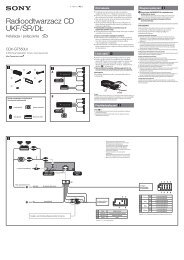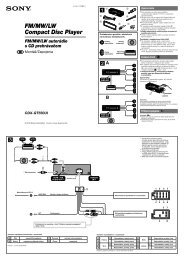Aroma Stainless Steel Rice CookerNRC-600 (NRC-600) - NRC-600 Recipe Booklet - Stainless Steel Rice Cooker
Aroma Stainless Steel Rice CookerNRC-600 (NRC-600) - NRC-600 Recipe Booklet - Stainless Steel Rice Cooker
Aroma Stainless Steel Rice CookerNRC-600 (NRC-600) - NRC-600 Recipe Booklet - Stainless Steel Rice Cooker
Create successful ePaper yourself
Turn your PDF publications into a flip-book with our unique Google optimized e-Paper software.
TM<br />
TM<br />
www.MyNutriWare.com<br />
<strong>Stainless</strong> <strong>Steel</strong> <strong>Rice</strong> <strong>Cooker</strong><br />
Whole Grain Guide &<br />
<strong>Recipe</strong> Book
NOTES:<br />
TM<br />
Whole Grain Information<br />
Much of the information and recipes on the following pages have been excerpted from<br />
Cooking with Grains by Coleen and Bob Simmons and appears courtesy of Bristol<br />
Publishing. For more information, to order this book or to view more of their fine cooking<br />
publications visit their website at www.bristolcookbooks.com.<br />
<strong>Aroma</strong> Wellness Co.<br />
6469 Flanders Drive<br />
San Diego, CA 92121<br />
U.S.A.<br />
1-800-276-6286<br />
www.mynutriware.com<br />
Published By:<br />
©2008 <strong>Aroma</strong> Housewares Company All Rights Reserved.<br />
1 46
NOTES<br />
ABOUT RICE<br />
<strong>Rice</strong> as we know it was most likely developed when<br />
wild grasses were domesticated about 5,000 years<br />
ago. Thousands of varieties or rice are grown around<br />
the world.<br />
<strong>Rice</strong> is a very important ingredient in the diet of over<br />
half the world’s population. In many cultures it is<br />
consumed 3 times a day. It can be used to make<br />
everything from soups to salads, side dishes, entrées<br />
and desserts.<br />
Brown <strong>Rice</strong><br />
Brown rice is a whole grain rice from which the outer<br />
husk has been removed. It is more nutritious than white<br />
rice and has a nutty flavor. Although long-grain is the<br />
most common type of brown rice, it is also available in<br />
medium- and short-grain varieties.<br />
White <strong>Rice</strong><br />
White rice is a brown rice that has been stripped of its<br />
bran and germ. Due to the stripping process, white rice<br />
has fewer nutrients and less fiber than brown rice. The<br />
long-grain variety of white rice cooks into soft separate<br />
grains.<br />
Converted <strong>Rice</strong><br />
Converted rice is white rice that has been steamed<br />
before the bran is removed, which preserves some<br />
nutrients. The grains remain firmer than regular<br />
long-grain white rice, which makes it a good choice to<br />
add to long-cooking dishes, such as jambalaya, gumbo<br />
and paella.<br />
Basmati <strong>Rice</strong><br />
Basmati is an aromatic white rice. Its long, tender grains<br />
have a distinct earthy aroma. It’s great with curries or in<br />
pilafs.<br />
Jasmine <strong>Rice</strong><br />
Jasmine, like Basmati, is a type of aromatic white rice<br />
with long separate grains and a distinct perfumy aroma.<br />
Wehani Red <strong>Rice</strong><br />
Wehani Red is a California medium-grained hybrid<br />
based on an Asian red rice variety. It has a chewy<br />
texture and an aroma similar to popcorn.<br />
Arborio <strong>Rice</strong><br />
Arborio is a short-grained variety that becomes creamy<br />
with constant stirring while cooking. It remains slightly<br />
firm after cooking, but absorbs the flavor of the cooking<br />
liquid. Arborio is a classic choice for making risotto.<br />
45<br />
2
ABOUT WHEAT<br />
NOTES<br />
Wheat is high in fiber and vitamins B and E, and it even<br />
provides some protein. Much of the wheat in the U.S. is<br />
consumed in either breads or pastas, which are often made<br />
from highly processed “white” wheat flour. Many of the nutrients<br />
inherent to wheat are lost after this process. The following are<br />
some of the most common forms of wheat available.<br />
Wheat Berries<br />
Wheat berries are whole wheat kernels from which the hull has<br />
been removed. Wheat berries have a somewhat meaty texture<br />
and are good substitutes for ground meat in recipes. Hard<br />
wheat berries come from high-protein “hard” wheat strains. Soft<br />
wheat berries come from low-protein “soft” wheat strains. Hard<br />
wheat berries take a little longer to cook than soft, but they are<br />
interchangeable in recipes.<br />
Cracked Wheat<br />
Cracked wheat is produced by cutting the wheat berry into 2 or<br />
3 pieces. It can be added to breads or used as a substitute for<br />
wheat berries or bulgur.<br />
Bulgur<br />
Bulgur is wheat that has been precooked by either steaming or<br />
parboiling, after which it is dried, cracked and separated into<br />
grades of fine, medium or coarse. Bulgur is easy to cook and<br />
its tender, chewy texture makes it perfect for salads, pilafs,<br />
savory stuffings and hearty soups. It also makes an excellent<br />
breakfast cereal.<br />
Spelt<br />
Spelt is an ancient form of wheat that has a high protein<br />
content. Spelt berries are interchangeable with wheat berries.<br />
Couscous<br />
Couscous is a type of tiny pasta that is made from wheat flour.<br />
Traditional couscous is made from cracked semolina, a strain<br />
of hard wheat. Couscous is a versatile grain and cooks quickly.<br />
The quick-cooking couscous found in markets generally<br />
steams in 5 minutes. Couscous is exceptional as either a side<br />
dish or in a salad.<br />
Israeli Couscous<br />
Israeli Couscous is a wheat product with “kernels” about the<br />
size of peppercorns. It can be served topped with sauce or<br />
tossed into a salad. It can most likely be found in Middle<br />
Eastern markets or specialty food stores.<br />
3 44
SUGGESTED NOURISHING INGREDIENTS<br />
ABOUT BARLEY<br />
ABOUT CORN<br />
Spinach<br />
Great Source of: Calcium, Iron, Magnesium, Manganese, Potassium, Vitamin A, Vitamin B2, Vitamin B6,<br />
Vitamin E, Vitamin K<br />
Tofu<br />
Great Source of: Essential Fatty Acids, Iron<br />
Tomatoes<br />
Great Source of: Manganese, Potassium, Vitamin A, Vitamin B1, Vitamin C, Vitamin K<br />
Tuna<br />
Great Source of: Iodine, Selenium, Vitamin B1, Vitamin B3, Vitamin B6<br />
Whole Wheat<br />
Great Source of: Dietary Fiber, Magnesium, Manganese<br />
Zucchini<br />
Great Source of: Copper, Dietary Fiber, Folic Acid, Magnesium, Manganese, Phosphorus, Potassium,<br />
Vitamin A, Vitamin C<br />
Barley is full of vitamins and is a great source of fiber,<br />
complex-carbohydrates and protein. Barley is low in fat<br />
and has no cholesterol. It is a delicious base for soups,<br />
stews, salads, curries, casseroles and desserts.<br />
Below is a bit more about some of the most common<br />
forms of barley available today.<br />
Pearl Barley<br />
Pearl barley is a whole-grain barley from which the outer<br />
hull has been removed. It is the most common form<br />
available. Pearl barley comes in both regular and<br />
quick-cooking forms.<br />
Barley Flakes<br />
Barley flakes make an excellent hot cereal, much like<br />
oatmeal. They are also great for use in baked goods.<br />
Barley Flour<br />
Barley flour is a low-gluten flour. It can be used in baked<br />
items to add a distinctive flavor, but it should be<br />
combined with wheat flour to achieve proper results. In<br />
general you can replace up to 25% of the wheat flour<br />
with barley flour in yeast breads and up to 50% of the<br />
wheat flour with barley flour in cookies and quick breads.<br />
Corn is so versatile that it can be incorporated into nearly<br />
every meal and snack. It is a good source of<br />
carbohydrates and is high in B vitamins, potassium and<br />
magnesium. Below is more information about several of<br />
the most popular forms of corn.<br />
Cornmeal<br />
Cornmeal is made from dried, ground corn kernels. It<br />
comes in yellow, white and blue varieties, depending on<br />
which corn kernels it was ground from.<br />
Polenta<br />
Polenta is a version of cornmeal made of both finely<br />
ground and coarsely ground cornmeal.<br />
Corn Flour<br />
Corn flour is cornmeal that has been very finely ground. It<br />
is mostly used in baking.<br />
Grits<br />
Grits are made from hominy, which is corn that has been<br />
soaked in wood ash or lye to loosen the outside hull and<br />
soften the kernel. There are many types of grits on the<br />
market today, some of which are made from untreated<br />
corn. Stone-ground grits have more flavor and texture<br />
than instant or quick-cooking grits. The most commonly<br />
available grits cook in only 5 minutes.<br />
43<br />
4
ABOUT OATS<br />
Oats have significant quantities of fiber, protein and trace<br />
minerals. Unlike many other grains, the oat germ, which<br />
contains oil, is not removed during processing. Due to<br />
this, oats have a higher fat content than most other<br />
grains.<br />
Rolled Oats<br />
Rolled oats, also called old-fashioned oats, are made by<br />
slicing raw oats before steaming and “rolling” them into<br />
flakes.<br />
<strong>Steel</strong>-Cut Oats<br />
<strong>Steel</strong>-cut, or Irish or Scotch oats, are whole-grain oats<br />
that have been coarsely sliced with sharp steel blades,<br />
which leads to a chewy texture.<br />
Quick-Cooking Oats<br />
Quick-cooking oats are processed the same way as<br />
rolled oats, but they are rolled into very thin slices over a<br />
hot surface, which precooks them slightly.<br />
Oat Flour<br />
Oat flour is made from finely ground oat groats. It has no<br />
gluten, so it must be used in conjunction with wheat<br />
flour. Oat flour adds a creamy, soft and moist texture.<br />
ABOUT MILLET<br />
Millet is gluten-free, which makes it a great grain for<br />
people who are allergic to wheat. Millet is also rich<br />
in fiber and protein. It cooks in about the same<br />
amount of time as rice and can be substituted for it<br />
in many rice recipes. Try it in soups, salads and<br />
main courses. Here are the most popular forms of<br />
millet.<br />
Hulled Millet Seeds<br />
Hulled millet seeds are whole-grain millet from<br />
which the indigestible outer hull has been removed.<br />
Millet Flour<br />
Millet flour is made from ground millet seeds. It has<br />
a slightly sweet flavor.<br />
Puffed Millet<br />
Puffed millet is a popular breakfast cereal and can<br />
be used as a crunchy topping for baked goods. It is<br />
similar to puffed rice and puffed wheat. Look for it in<br />
boxes in the cereal aisle of the supermarket or in<br />
bulk bins.<br />
SUGGESTED NOURISHING INGREDIENTS<br />
Mushrooms<br />
Great Source of: Copper, Selenium, Vitamin B2, Vitamin B3, Zinc<br />
Oats<br />
Great Source of: Dietary Fiber, Magnesium, Manganese, Phosphorus, Selenium, Vitamin B1<br />
Olive Oil<br />
Great Source of: Essential Fatty Acids<br />
Onion<br />
Great Source of: Dietary Fiber, Vitamin C<br />
Parsley<br />
Great Source of: Folic Acid, Vitamin K<br />
Pineapple<br />
Great source of: Manganese, Vitamin C<br />
Quinoa<br />
Great Source of: Copper, Iron, Magnesium, Manganese, Phosphorus<br />
Rye<br />
Great Source of: Dietary Fiber, Magnesium, Manganese, Phosphorus, Selenium<br />
Spelt<br />
Great Source of: Copper, Dietary Fiber, Magnesium, Manganese, Phosphorus, Vitamin B3<br />
5 42
SUGGESTED NOURISHING INGREDIENTS<br />
Eggs<br />
Great Source of: Iodine, Iron, Phosphorus, Vitamin D<br />
Fish<br />
Great Source of: Essential Fatty Acids, Iron, Phosphorus<br />
Garlic<br />
Great Source of: Manganese, Vitamin B6, Vitamin C<br />
Green Peas<br />
Great Source of: Dietary Fiber, Folic Acid, Manganese, Vitamin B1, Vitamin C, Vitamin K, Zinc<br />
Kale<br />
Great Source of: Manganese, Vitamin A, Vitamin C, Vitamin K<br />
Kamut<br />
Great Source of: Iron, Manganese, Magnesium, Phosphorus<br />
Lemon, Lime<br />
Great source of: Vitamin C<br />
Milk<br />
Great Source of: Calcium, Iodine, Phosphorus, Vitamin D<br />
Millet<br />
Great Source of: Magnesium, Manganese, Phosphorus<br />
ABOUT BUCKWHEAT<br />
Although buckwheat is not a true grain, it is treated as such<br />
in cooking. It is high in protein, potassium and phosphorus.<br />
Buckwheat has a distinctive, somewhat earthy taste. It is<br />
very versatile and comes in many forms.<br />
Kasha<br />
Kasha is the familiar name for roasted buckwheat groats or<br />
kernels. Kasha is a quick-cooking grain that can be cooked<br />
in milk for a nutritious hot breakfast cereal, or cooked in<br />
water or stock for pilafs or salads.<br />
Soba<br />
Soba are Japanese-style noodles made from buckwheat<br />
and wheat flour. Soba can be used in much the same way<br />
as wheat pasta.<br />
Buckwheat Flour<br />
Buckwheat flour is made from ground buckwheat seeds. It<br />
has a very pronounced flavor. Buckwheat flour is most often<br />
used in blinis (tiny Russian-style savory pancakes) and<br />
breakfast pancakes.<br />
ABOUT QUINOA<br />
Quinoa (pronounced “KEEN-wah”) was a staple food of<br />
the Incas for thousands of years. Quinoa is not a “true”<br />
grain. Unlike true grains, quinoa has balanced amino<br />
acids and is considered to have a higher protein content<br />
than any other grain. While growing, individual grains of<br />
quinoa are covered with a natural, bitter-tasting coating,<br />
which protects it from insects and birds. Commercially<br />
available quinoa has usually been washed, but it is still<br />
a good idea to rinse the grains well before cooking.<br />
Whole-Grain Quinoa<br />
The whole-grain variety has a mild, delicate flavor and a<br />
slightly crunchy texture. The cooked grains are almost<br />
translucent. Cooked quinoa can be a substitute for rice<br />
in dishes, and just like rice, it serves as a foil for strong<br />
flavors and seasonings.<br />
Quinoa Flour<br />
Quinoa flour is made from ground quinoa grains. It<br />
lends a distinctive flavor to baked goods and can be<br />
made into pasta.<br />
41<br />
6
ABOUT AMARANTH<br />
ABOUT KAMUT<br />
ABOUT RYE<br />
SUGGESTED NOURISHING INGREDIENTS<br />
Amaranth is rich in protein, lysine, calcium<br />
and other minerals. It has an aroma and<br />
flavor that reminds people of celery.<br />
Whole-Grain Amaranth<br />
Whole grain amaranth has a tendency to<br />
stick together, making it an ideal fat-free<br />
thickener for soups and sauces. Cooked<br />
amaranth quickly becomes quite firm upon<br />
cooling, but it can easily be reconstituted by<br />
reheating.<br />
Amaranth Flour<br />
Amaranth flour is made from ground<br />
amaranth seeds.<br />
Amaranth Flakes<br />
Flakes of amaranth make an interesting<br />
breakfast cereal and are perfect to use as a<br />
crunchy topping for a casserole.<br />
Kamut (pronounced “kah-MOOT”) is an<br />
ancient Egyptian form of wheat with<br />
kernels 2 to 3 times larger than regular<br />
wheat. Although kamut does contain<br />
gluten, some people who are sensitive<br />
to wheat can still eat it.<br />
Whole-Grain Kamut<br />
Whole-grain kamut can be substituted<br />
for wheat berries in most recipes.<br />
Kamut Flakes<br />
A cereal form of kamut, kamut flakes<br />
can be used in baking or for a crispy<br />
topping on gratin or casserole.<br />
Rye can be grown in cold damp<br />
climates where wheat does not grow<br />
well. It has a gray hue and tangy taste.<br />
Rye Berries<br />
Rye berries can be substituted for<br />
wheat, spelt or triticale berries in<br />
recipes.<br />
Rye Flour<br />
Commonly used in pumpernickel and<br />
rye breads, rye flour contains little<br />
gluten.<br />
Buckwheat<br />
Great Source of: Dietary Fiber, Magnesium, Manganese<br />
Bulgur<br />
Great Source of: Dietary Fiber, Iron, Manganese<br />
Carrots<br />
Great source of: Dietary Fiber, Potassium, Vitamin A, Vitamin C, Vitamin K<br />
Cauliflower<br />
Great Source of: Dietary Fiber, Folic Acid, Vitamin C<br />
Celery<br />
Great Source of: Vitamin C, Vitamin K<br />
Chicken<br />
Great Source of: Iron, Phosphorus, Vitamin B3, Vitamin B6<br />
Chard<br />
Great Source of: Dietary Fiber, Iron, Magnesium, Potassium, Vitamin E, Vitamin C<br />
Collard Greens<br />
Great Source of: Calcium, Dietary Fiber, Folic Acid, Vitamin A, Vitamin E, Vitamin K<br />
Corn<br />
Great Source of: Dietary Fiber, Folic Acid, Manganese, Phosphorus, Vitamin B1, Vitamin B5<br />
7 40
SUGGESTED NOURISHING INGREDIENTS<br />
Amaranth<br />
Great Source of: Calcium, Vitamin C<br />
Apples<br />
Great Source of: Dietary Fiber, Vitamin C<br />
Asparagus<br />
Great Source of: Folic Acid, Vitamin B1, Vitamin B3<br />
Barley<br />
Great Source of: Copper, Dietary Fiber, Manganese, Phosphorus, Selenium<br />
Beef<br />
Great Source of: Iron, Phosphorus, Vitamin B2, Vitamin B3, Vitamin B6, Vitamin B12, Zinc<br />
Bell Peppers<br />
Great Source of: Vitamin A, Vitamin B6, Vitamin C<br />
Broccoli<br />
Great Source of: Dietary Fiber, Folic Acid, Vitamin C, Vitamin K<br />
Brown <strong>Rice</strong><br />
Great Source of: Magnesium, Manganese, Selenium<br />
Brussels Sprouts<br />
Great Source of: Dietary Fiber, Folic Acid, Manganese, Potassium, Vitamin A, Vitamin B1, Vitamin B6,<br />
Vitamin C, Vitamin K<br />
ABOUT TRITICALE<br />
Triticale (pronounced “tri-ti-CAY-lee”) is a cross between<br />
wheat and rye that thrives in cold, damp climates where<br />
wheat doesn’t grow well.<br />
Triticale Flour<br />
Tritical flour has a small amount of gluten, which if used<br />
exclusively in bread recipes requires more kneading<br />
and only one rising period.<br />
Triticale Berries<br />
Triticale berries are similar to wheat berries, but smaller.<br />
They may be substituted for wheat berries, rye berries,<br />
brown rice or pearl barley in recipes.<br />
ABOUT FLAX<br />
Research suggests that flax may provide many<br />
beneficial nutrients. It has soluble fiber, Omega-3<br />
fatty acids and high-quality protein. Use caution<br />
when using flax in cooking as some people are<br />
allergic to it. Flax is used for baked goods and<br />
crackers or it can be added to cooked vegetable<br />
dishes or grain salads.<br />
Milled Flaxseed<br />
Milled flaxseed is available, but it doesn’t keep as<br />
long as whole flaxseed. It needs to be stored in<br />
the refrigerator and used within a few weeks.<br />
Whole Flaxseed<br />
Whole flaxseed can be ground down in a coffee<br />
or spice mill as needed.<br />
39<br />
8
TM<br />
Easy to Cook <strong>Recipe</strong>s<br />
NUTRITION INFO:<br />
Vitamin K<br />
The K in Vitamin K comes from the German word “koagulation,” because it is necessary for blood clotting.<br />
It also plays an important role in kidney function and bone growth and repair.<br />
Key Benefit:<br />
Sources:<br />
Proper blood clotting<br />
Broccoli, Brussels Sprouts, Carrots, Celery, Collard Greens, Green Peas, Kale, Parsley,<br />
Spinach, Tomatoes<br />
Zinc<br />
Zinc is an essential mineral that can be found in every cell of the body. It stimulates nearly 100 different<br />
enzymes. It also helps to maintain a healthy immune system (great at preventing, or shortening the length<br />
of, colds), is needed for wound healing and helps to maintain a proper sense of smell and taste.<br />
Key Benefit: Strengthened immune system<br />
Sources: Beef, Green Peas, Mushrooms,<br />
9<br />
www.MyNutriWare.com<br />
38
NUTRITION INFO:<br />
Vitamin C<br />
Also known as ascorbic acid, promotes healthy gums, strengthens the immune system, prevents cell<br />
damage and even helps wounds to heal. It also helps the body absorb iron.<br />
Key Benefit:<br />
Sources:<br />
Prevent illness<br />
Amaranth, Apples, Bell Peppers, Broccoli, Brussels Sprouts, Carrots, Cauliflower, Celery,<br />
Corn, Green Peas, Kale, Lemon, Lime, Onion, Pineapple, Tomatoes, Zucchini<br />
Vitamin D<br />
Vitamin D helps the body better absorb calcium from both food and supplements. It also plays a role in<br />
bone and tooth formation and healthy muscle and nerve function. Studies have shown that Vitamin D may<br />
help in preventing osteoporosis.<br />
Key Benefit: Healthy muscle and nerve function<br />
Sources: Eggs, Milk<br />
Vitamin E<br />
Vitamin E is a powerful antioxidant that works to neutralize damaging free radicals. It is also important in<br />
maintaining a healthy circulatory system.<br />
Key Benefit: Powerful antioxidant<br />
Sources: Chard, Collard Greens, Spinach<br />
Ingredients:<br />
1 cup quinoa, rinsed<br />
2 cups water or broth<br />
Pinch of salt<br />
Basic Cooked Quinoa<br />
Makes 3½-4cups<br />
Place quinoa in a sieve and rinse well under cold running water. Transfer to the rice cooker<br />
with water and salt. Turn cooker to “Cook.” Cover and allow it to simmer for 10 to 20<br />
minutes, until grains are translucent and the outer germ separates from grain. Drain any<br />
excess water and cool.<br />
37<br />
10
Ingredients:<br />
1 cup regular pearl barley<br />
3 cups water or broth<br />
½ tsp. salt, if using water<br />
Basic Cooked Pearl Barley<br />
Pearl barley requires no soaking. Take a couple of minutes to sort through it and remove<br />
any stones or extraneous materials that may have slipped through the packaging process.<br />
Instant or quick-cooking barley usually cooks in 10 to 12 minutes. Follow package directions<br />
for specifics. Makes 3½-4 cups<br />
Place barley, water and salt (if using) into the rice cooker. Turn to “Cook.” Cover and allow<br />
to cook for roughly 45 minutes, until barley is tender and moist or the liquid is absorbed.<br />
Fluff grains with a fork. Cool before refrigerating.<br />
NUTRITION INFO:<br />
Vitamin B3<br />
Also known as Niacin, is important for converting calories from protein and fat and carbs into energy. It also<br />
promotes a normal appetite and healthy-looking skin.<br />
Key Benefits: Detoxification, cholesterol reduction, skin beauty<br />
Sources: Asparagus, Beef, Chicken, Mushroom, Spelt, Tuna<br />
Vitamin B6<br />
Also known as pyridoxine, helps with brain function and in converting protein to energy.<br />
Key Benefit: Maintain proper brain function and energy levels<br />
Sources: Beef, Bell Peppers, Brussels Sprouts, Chicken, Garlic, Spinach, Tuna<br />
Vitamin B12<br />
Also known as cobalamin, combines with folic acid to produce healthy red blood cells. It also helps to keep<br />
the central nervous system healthy.<br />
Key Benefit: Healthy red blood cells<br />
Sources: Beef<br />
11 36
NUTRITION INFO:<br />
Vitamin A<br />
Also known as retinol, helps eyes adjust to brightness changes. It also is needed to keep eyes, skin and<br />
mucous membranes properly moist.<br />
Key Benefit:<br />
Sources:<br />
Proper eye function<br />
Bell Peppers, Brussels Sprouts, Carrots, Collard Greens, Kale, Spinach, Tomatoes,<br />
Zucchini<br />
Vitamin B1<br />
Also known as Thiamin, keeps the body going by converting blood sugar into energy. It also maintains<br />
mucous membrane health and is essential for proper cardiovascular, nervous system and muscular<br />
function.<br />
Key Benefit: Energy<br />
Sources: Asparagus, Brussels Sprouts, Corn, Green Peas, Oats, Tomatoes, Tuna,<br />
Vitamin B2<br />
Also known as Riboflavin, combines with other B-complex vitamins to process calories from carbs, protein<br />
and fat. Riboflavin is necessary for growth and proper red cell production. Taking the daily recommended<br />
amount also promotes healthy skin and good vision.<br />
Key Benefits: Red cell production, vision health, skin beauty<br />
Sources: Beef, Mushrooms, Spinach<br />
Ingredients:<br />
1 cup kamut<br />
3 cups cold water, plus water to cover<br />
Basic Cooked Kamut<br />
Do not add salt to kamut while cooking, doing so may increase the cooking time and/or<br />
toughen the grains. Makes 3 cups<br />
Place kamut into the ‘Inner Pot’ and cover with water, cover and let stand for 6 to 8 hours or<br />
overnight; drain. Add 3 cups cold water to soaked kamut in rice cooker. Cover and turn to<br />
“Cook.” Allow to simmer for 40 to 50 minutes, until kamut is tender.<br />
35<br />
12
Ingredients:<br />
1 cup amaranth<br />
3 cups water or broth<br />
Pinch of Salt<br />
Basic Cooked Amaranth<br />
Amaranth cooks into a thick, creamy mixture, which is delicious in soups and stews. Cooked<br />
amaranth can be thinned to the desired consistency with water. Makes 2 cups<br />
Place amaranth into your rice cooker with water and salt and turn it to “Cook” mode. Cover<br />
cooker and let simmer for 20 to 25 minutes, until grains are tender and liquid has been<br />
absorbed.<br />
NUTRITION INFO:<br />
Phosphorus<br />
Phosphorus, along with calcium, is required for building strong bones and teeth. It also aids in the proper<br />
digestion of niacin and riboflavin and helps kidneys to efficiently excrete waste.<br />
Key Benefits:<br />
Sources:<br />
Strong bones and teeth, increased kidney effectiveness<br />
Barley, Beef, Chicken, Corn, Eggs, Fish, Kamut, Milk, Millet, Oats, Quinoa, Rye, Spelt,<br />
Zucchini<br />
Potassium<br />
Potassium is an essential dietary mineral and electrolyte that helps to regulate blood pressure and heart<br />
function.<br />
Key Benefit: Lower blood pressure<br />
Sources: Brussels Sprouts, Carrots, Chard, Spinach, Tomatoes, Zucchini<br />
Selenium<br />
Selenium is essential in small quantities; however it can become toxic at high levels. It is necessary for the<br />
formation of functional protein. Studies have also linked selenium to lower instances of cancer in many<br />
organs.<br />
Key Benefits: Proper protein production<br />
Sources: Barley, Brown <strong>Rice</strong>, Mushrooms, Oats, Rye, Tuna<br />
13<br />
34
NUTRITION INFO:<br />
Iron<br />
Iron is an important part in the metabolism of almost all living organisms. In humans, iron is an essential<br />
component of hundreds of proteins and enzymes.<br />
Key Benefit: Oxygen transport and storage, antioxidant and pro-oxidant functions<br />
Sources: Beef, Bulgur, Chard, Chicken, Eggs, Kamut, Quinoa, Spinach, Tofu<br />
Magnesium<br />
Magnesium is an important element of both the structure and function of the human body. The majority of<br />
magnesium within the body can be found in bones. Magnesium is also a part of more than 300 essential<br />
metabolic reactions.<br />
Key Benefits: Bone, cell and membrane structure, energy production and synthesis of essential<br />
molecules<br />
Sources: Brown <strong>Rice</strong>, Buckwheat, Chard, Kamut, Millet, Oats, Quinoa, Rye, Spelt, Spinach, Whole<br />
Wheat, Zucchini<br />
Manganese<br />
Manganese is an antioxidant that plays an important role in energy production and the breakdown of amino<br />
acids. It is a catalyst in the metabolizing of calories and fats as well.<br />
Key Benefit: Antioxidant, energy production<br />
Sources: Barley, Brown <strong>Rice</strong>, Brussels Sprouts, Buckwheat, Bulgur, Corn, Garlic, Green Peas, Kale,<br />
Kamut, Millet, Oats, Pineapple, Quinoa, Rye, Spelt, Spinach, Tomatoes, Whole Wheat,<br />
Zucchini<br />
Ingredients:<br />
4 cups cold water, chicken broth or<br />
a combination<br />
1 tsp. salt<br />
1 cup coarse-ground polenta<br />
2 tbs. butter, softened<br />
Basic Cooked Polenta<br />
⅓<br />
Freshly ground black pepper,<br />
to taste<br />
cup freshly grated Parmesan cheese<br />
Olive oil (optional)<br />
Starting the polenta in cold water helps to avoid lumps. Polenta doesn’t need continuous<br />
attention, but should be stirred frequently to keep it from sticking to the bottom of your ‘Inner<br />
Pot.’ For firm polenta, the mixture should be thick enough that a wooden spoon placed in<br />
the center will stand upright for 10 to 15 seconds. Servings: 4-6<br />
Add cold water and salt to rice cooker. Stir in polenta and turn to “Cook.” Let simmer for 10<br />
to 15 minutes, stirring every few minutes. Cook until polenta is soft and creamy and grains<br />
are soft. Stir in butter, pepper and cheese. Serve immediately in a warmed large bowl or on<br />
a platter.<br />
33<br />
14
Ingredients:<br />
1 cup rye or triticale berries<br />
3 cups cold water, plus water to cover<br />
Basic Cooked Rye or Triticale Berries<br />
Rye berries and triticale berries are very sturdy and require lengthy cooking times. If buying<br />
berries in bulk, carefully sort through them to remove and small stones or debris. Rinse rye<br />
or triticale berries well in cold water before using. Do not salt the berries until after they are<br />
cooked, as salt slows down the absorption of liquid in the grain.<br />
Place rye or triticale berries in a large bowl and cover with cold water. Let stand covered<br />
overnight; drain. In the rice cooker, pour in 3 cups water and turn to “Cook.” Add soaked rye<br />
or triticale berries. Replace lid and let simmer for 30 to 45 minutes, until tender.<br />
NUTRITION INFO:<br />
Fiber<br />
Fiber absorbs large amounts of water in the bowels, softening stool and helping to relieve constipation.<br />
Fiber has also been shown to be helpful in preventing heart disease, cancer, diabetes and the formation of<br />
kidney stones.<br />
Key Benefits:<br />
Sources:<br />
Stool softening/improved regularity, disease prevention<br />
Apples, Barley, Broccoli, Brussels Sprouts, Buckwheat, Bulgur, Carrots, Cauliflower, Chard,<br />
Collard Greens, Corn, Green Peas, Oats, Onion, Rye, Spelt, Whole Wheat, Zucchini<br />
Folic Acid<br />
Folic acid is a key element in cellular function and repair, as well as the synthesis and repair of DNA.<br />
Key Benefit: Cellular function and repair<br />
Sources: Asparagus, Broccoli, Brussels Sprouts, Cauliflower, Collard Greens, Corn, Green Peas,<br />
Parsley, Zucchini<br />
Iodine<br />
Iodine is an element needed for proper thyroid function, which plays a role in the basic metabolism<br />
processes of the body. It also has a role in maintaining energy and helping skin, nails, teeth and hair to be<br />
healthy and strong.<br />
Key Benefit: Proper thyroid function<br />
Sources: Eggs, Milk, Tuna<br />
15<br />
32
NUTRITION INFO:<br />
Calcium<br />
Calcium is the most common mineral in the body, approximately 99% of which is in the bones and teeth.<br />
The final 1% of the body’s calcium makeup is found in the blood and soft tissue. This 1% of calcium is vital<br />
for proper bodily function. In fact, if not enough calcium is absorbed through diet, the body will begin to<br />
de-mineralize bones to maintain the proper calcium levels in the bloodstream. Therefore, a diet with the<br />
proper levels of calcium is mandatory to maintain a strong skeleton.<br />
Key Benefits: Strong bones and teeth, regulation of calcium levels in blood<br />
Sources: Amaranth, Collard Greens, Milk, Spinach<br />
Copper<br />
Copper is needed for the proper function of enzymes known as cuproenzymes.<br />
Key Benefits: Energy production, central nervous system function and antioxidant function.<br />
Sources: Barley, Mushrooms, Quinoa, Spelt, Zucchini<br />
Essential Fatty Acids<br />
Omega-3 fatty acids are polyunsaturated fats. Alpha-linolenic acid (ALA) is considered an essential fatty<br />
acid because it cannot be synthesized by the human body. Studies have shown that diets with increased<br />
levels of Omega-3 fatty acids can lead to decreased risks of heart disease.<br />
Key Benefits: Vision and proper eye function, proper nervous system function, improved cardiovascular<br />
function<br />
Sources: Fish, Flaxseed, Olive Oil, Tofu<br />
Ingredients:<br />
¾ cup hulled millet seeds<br />
2 cups water or broth<br />
¼ tsp. salt<br />
Basic Cooked Millet<br />
Hulled millet is more flavorful when it is toasted before cooking. Makes 3½ cups<br />
Pour millet, water and salt into your rice cooker. Turn it to “Cook.” Cover and let simmer for<br />
15 to 20 minutes, until most of the water has been absorbed. Turn cooker to “Keep-Warm”<br />
and fluff grains with a fork. Remove grains from cooker and allow them to cool to room<br />
temperature before refrigerating. Keeps covered for 2 to 3 days in the refrigerator.<br />
31<br />
16
Ingredients:<br />
2 cups water or broth<br />
Salt (if not using canned broth), to<br />
taste<br />
1 large egg, lightly beaten<br />
1 cup kasha<br />
Basic Cooked Kasha<br />
TM<br />
Nutrition Guide<br />
There are two kinds of kasha: a lightly roasted type and a darker roasted version, with a<br />
more assertive flavor. Coating the kasha with egg before cooking produces individual grains<br />
after cooking. Cooking kasha in broth adds flavor. Makes 3½ cups<br />
Pour water in your rice cooker and turn it to “Cook.” Add salt, if using. In a bowl, combine<br />
egg and kasha and stir to thoroughly coat kasha with egg. Immediately pour kasha grains<br />
into the rice cooker and allow it to simmer for 10-15 minutes, until kasha is tender. Turn off<br />
cooker, and remove kasha, drained if necessary. Fluff grains with a fork and cool.<br />
17<br />
30
Ingredients:<br />
2 tbs. butter<br />
1 tbs. full-flavored olive oil<br />
1 large or 2 small leeks, white part<br />
only, well washed and thinly sliced<br />
2 large carrots, peeled and cut into ½-inch dice<br />
1 large stalk celery with leaves, thinly sliced<br />
4 oz. green beans, stemmed and cut into ½-inch pieces<br />
2 medium zucchini, trimmed, cut in<br />
half lengthwise and thinly sliced<br />
½ cup medium-grained bulgur<br />
4 large tomatoes, peeled, seeded and chopped<br />
2 cups chicken broth<br />
4 cups water<br />
2 sprigs fresh parsley<br />
3 sprigs fresh thyme<br />
1 bay leaf<br />
1 tsp. salt<br />
Freshly ground pepper, to taste<br />
Ingredients:<br />
1 yellow crookneck squash or zucchini, diced<br />
½ cup diced carrot<br />
½ cup cooked peas<br />
½ cup diced roasted yellow or red bell pepper<br />
4 green onions, white part only, minced<br />
2 cups brown rice<br />
2 tbs. chopped fresh parsley<br />
5-6 fresh mint leaves, cut into ribbons<br />
1½ tbs. lemon juice<br />
1 tbs. rice vinegar<br />
2 tbs. sesame tahini<br />
1 tbs. olive oil<br />
1 tbs. water<br />
½ tsp. ground cumin<br />
Salt and freshly ground pepper, to taste<br />
5-6 drops Tabasco Sauce<br />
Garden Vegetable Soup<br />
2 cloves garlic, minced<br />
1 jalapeño chile, stemmed, seeded and finely chopped<br />
1 cup fresh or frozen peas<br />
Freshly grated Parmesan cheese<br />
15 oz. cannelloni, garbanzo or other<br />
beans, rinsed and drained<br />
Chopped fresh basil for garnish<br />
For this soup, substitute the freshest vegetables from your summer farmers’ market, such as<br />
asparagus, corn, yellow squash or other vegetables. This soup keeps well in the refrigerator<br />
for several days. Servings: 6<br />
Turn cooker to “Cook.” Heat butter and olive oil. Add leeks, carrots, celery, green beans,<br />
zucchini, garlic and jalapeño. Sauté for 3 to 4 minutes. Be sure to use a long handled<br />
wooden spoon when stirring to avoid burns. Add bulgur, tomatoes, chicken broth, water,<br />
parsley, thyme, bay leaf, salt and pepper. Let simmer partially covered for 25-30 minutes.<br />
Remove and discard parsley, thyme and bay leaf. Add peas and beans. Adjust seasonings<br />
and cook soup for 5 minutes to heat through. Serve hot in soup bowls garnished with fresh<br />
basil. Pass Parmesan cheese.<br />
Brown <strong>Rice</strong> Salad w/ Tahini-Lemon Dressing<br />
Cool the rice before tossing it with the vegetables and dressing. Sesame tahini is available<br />
in Middle Eastern markets or in the ethnic food section of some major supermarkets.<br />
Servings: 4-6<br />
While cooking brown rice, add squash and carrot to steam tray; set to “Cook.” Squash<br />
needs to steam for 10 minutes; carrots for 15. Place steamed squash and carrots in a large<br />
bowl. Add peas, peppers, onions, rice, parsley and mint; mix well. In a small bowl mix lemon<br />
juice, rice vinegar, sesame tahini, olive oil, water, cumin, salt, pepper and Tabasco. Add<br />
dressing mixture to rice mixture and mix well. Serve immediately.<br />
29 18
Ingredients:<br />
1 cup basmati or long-grain rice<br />
2 tbs. butter or ghee (clarified butter)<br />
1 small onion, quartered and thinly<br />
sliced<br />
5 large cremini (brown) or white<br />
mushrooms. trimmed and cut into<br />
matchstick-sized pieces<br />
1 small clove garlic<br />
¼ tsp. cardamom<br />
1⅓ cups vegetable broth<br />
½ tsp. salt, or less to taste<br />
½ cup small green peas<br />
Ingredients:<br />
1 cup medium-grained bulgur<br />
2½ cups milk, plus more for serving<br />
Pinch of salt<br />
3 tbs. honey, plus more for serving<br />
(optional)<br />
½<br />
½<br />
cup raisins, dried cranberries or dried<br />
apple pieces<br />
tsp. cinnamon<br />
Sugar for serving, optional<br />
Classic Mushroom Pilaf<br />
Spiced Breakfast Bulgur<br />
<strong>Aroma</strong>tic basmati rice is perfect for this side dish, but you can use another type of long-grain<br />
rice if you wish. Converted rice remains too firm and will not produce the desired texture for<br />
the pilaf. Start soaking the rice about 20 minutes before cooking the pilaf. The green peas<br />
can be cooked with rice, or cooked separately and added just before serving to preserve<br />
their bright green color. Servings: 4<br />
Place rice in a medium bowl and rinse in several changes of cold water. When water runs<br />
clear, cover rice with cold water by about 1 inch and let stand for 30 minutes. Drain in a<br />
sieve and discard soaking solution. Turn rice cooker to “Cook”, add butter to melt in the<br />
‘Inner Pot’. Add onion and sauté for 3 to 4 minutes. Add mushrooms and sauté for 5 to 6<br />
minutes, until mushroom liquid is released and they are slightly browned. Add garlic and<br />
rice, sauté until rice is well coated with butter and grains begin to turn translucent. Add<br />
cardamom, broth and salt, let it come to a boil. Stir in peas. Cover cooker and let simmer for<br />
15 to 25 minutes. Do not remove lid during cooking time. Turn cooker to “Keep-Warm” mode<br />
and let stand covered for 5 minutes. Remove lid and gently fluff grains with a fork; serve<br />
immediately.<br />
Hot bulgur with dried fruit and spices makes a great breakfast cereal. Servings: 4<br />
In your rice cooker, combine bulgur, milk, salt, honey, raisins and cinnamon. Turn the cooker<br />
to “Cook” and allow the contents to come to a boil. Let simmer for 15 to 20 minutes, until<br />
mixture thickens, stirring frequently. Pour into serving bowls and pass milk and honey or<br />
sugar.<br />
19 28
Ingredients:<br />
2 cups cooled Basic Cooked Kasha<br />
(see page 17)<br />
2 cups diced steamed carrots, ⅜-inch<br />
dice<br />
3 tbs. olive oil<br />
1 tbs. rice vinegar<br />
2 tbs. lemon juice<br />
4 tsp. Dijon-style mustard<br />
½ tsp. sugar<br />
1 tsp. sesame oil<br />
½ tsp. grated fresh ginger<br />
Red pepper flakes, to taste<br />
¼ cup fresh cilantro leaves, packed<br />
2 tbs. chopped fresh parsley<br />
Ingredients:<br />
1 tbs. vegetable oil<br />
1 cup diced onion<br />
1 large jalapeño chile, stemmed,<br />
seeded and minced<br />
Kernels from 4 large ears of sweet corn<br />
3 cups water<br />
3 cups chicken broth<br />
½ cup quinoa, rinsed<br />
Salt and freshly ground pepper, to taste<br />
2 tbs. fresh lime juice<br />
1 tbs. butter<br />
Sweet basil leaves cut into<br />
ribbons for garnish<br />
kasha-Carrot Salad w/ Mustard Dressing<br />
Steaming the diced carrots while cooking the kasha makes this a quick salad to put<br />
together. Servings: 4<br />
While cooking kasha according to the “Basic Cooked Kasha” recipe on page 17, add diced<br />
carrots to the ‘Steam Tray’ and insert it into the rice cooker. Carrots typically take about 15<br />
minutes to fully steam, so you may want to place the ‘Steam Tray’ in the cooker for a few<br />
minutes with the water prior to adding the kasha. In a medium bowl, combine kasha and<br />
carrots. Season with salt and pepper and mix well. In a blender or food processor, combine<br />
olive oil, vinegar, lemon juice, mustard, sugar, sesame oil, ginger, pepper flakes and cilantro<br />
leaves. Process until mixture is creamy. Pour mixture over kasha and mix well. Check<br />
seasonings. Add chopped parsley and toss well.<br />
Creamy Corn & Quinoa Soup<br />
Make this soup the day before you serve it and present it as a first course for a summer<br />
dinner party. For a different accent, garnish it with fresh cilantro and thin lime slices, or<br />
dollops of fresh tomato and avocado salsa. Amaranth or millet can be substituted for the<br />
quinoa. Servings: 4<br />
Turn rice cooker to “Cook.” Add oil and allow it to heat. Add onion and jalapeño and sauté<br />
for 3 to 4 minutes. Add corn to cooker and allow to cook for 2 to 3 minutes. Add water, cover<br />
pot and allow to simmer for 15 to 20 minutes, until vegetables are tender. Turn rice cooker to<br />
“Keep-Warm” mode. Using caution as vegetables will be hot, blend in batches until smooth.<br />
Strain smooth vegetables through a coarse sieve. Return smooth vegetable mixture to rice<br />
cooker, add chicken broth and turn it back to “Cook” mode. Stir in quinoa, salt and pepper.<br />
Cover and simmer for 15 to 20 minutes, until quinoa is translucent. Add lime juice and adjust<br />
seasoning. Ladle soup into warm bowls and garnish each serving with a few ribbons of<br />
basil. Serve immediately.<br />
27<br />
20
Ingredients:<br />
1 cup Basic Cooked Millet (see page 16)<br />
1 can (6½oz.) water or oil packed<br />
tuna, drained<br />
⅓ cup finely chopped celery<br />
1 medium tomato, peeled, seeded and<br />
chopped (about ½ cup)<br />
2 tbs. finely chopped green onions or fresh chives<br />
¼<br />
¼<br />
cup chopped fresh parsley<br />
tsp. Tabasco Jalapeño sauce<br />
Salt and freshly ground pepper, to taste<br />
2 tbs. buttermilk<br />
1 tbs. lemon juice<br />
2 tsp. full-flavored olive oil<br />
Butter lettuce or radicchio leaves (optional)<br />
Ingredients:<br />
1¾ cups vanilla-flavored <strong>Rice</strong> Dream<br />
non-dairy beverage<br />
1¼ cups water<br />
Pinch of salt<br />
¾ cup jasmine rice<br />
⅓ cup sugar<br />
4 oz. egg substitute<br />
1 tsp. vanilla extract<br />
8 oz. crushed pineapple with juice<br />
1 tbs. dark rum (optional)<br />
Tuna Millet Salad<br />
This salad travels well and makes great lunchbox or picnic fare. Roll it up in lettuce leaves<br />
or spoon it into radicchio cups for an attractive presentation. This recipe doubles easily.<br />
Servings: 2-3<br />
After cooking the millet in your rice cooker according to the “Basic Cooked Millet” recipe on<br />
page 16, combine millet, tuna, celery tomato, onions and parsley in a medium bowl; lightly<br />
toss together. Stir in Tabasco, salt and pepper. Stir in buttermilk, lemon juice and olive oil.<br />
Adjust seasonings. Serve immediately spooned into lettuce or radicchio leaves, if desired.<br />
Refrigerate for up to 2 days. Bring to room temperature before serving.<br />
Note: If using oil packed tuna, reduce olive oil to 1 teaspoon.<br />
Pineapple <strong>Rice</strong> Pudding<br />
Fragrant jasmine rice pairs with vanilla <strong>Rice</strong> Dream non-dairy beverage for a creamy,<br />
guilt-free dessert. <strong>Rice</strong> Dream is available in most large supermarkets. Since it doesn’t<br />
require refrigeration until it is opened, look for <strong>Rice</strong> Dream on the shelf near the canned<br />
milk in a 1-quart cardboard container. Servings: 4-6<br />
Pour 1 cup of <strong>Rice</strong> Dream and the water into the ‘Inner Pot.’ Set to “Cook” until it is boiling.<br />
Stir in salt and rice. Cover and let simmer for 30 minutes. In a small bowl, whisk together<br />
remaining ¾ cup <strong>Rice</strong> Dream, sugar, egg substitute and vanilla. Stir pineapple with juice into<br />
rice cooker. Stir in egg mixture and rum (if using). Let cook, stirring frequently, until mixture<br />
simmers and thickens. Turn off cooker and pour contents into a bowl. Pudding will thicken<br />
somewhat as it cools. Serve warm, or refrigerate and serve cold.<br />
21 26
Ingredients:<br />
3½ cups chicken broth<br />
3 cups water, plus more if needed for<br />
reheating<br />
1 cup long or medium grain rice<br />
Thin egg omelet, cut into strips for<br />
garnish (optional)<br />
Thinly sliced green onions or chopped<br />
fresh chives for garnish (optional)<br />
Diced cooked ham, chicken or pork for<br />
garnish (optional)<br />
Soy sauce for garnish (optional)<br />
Hot pepper sauce for garnish (optional)<br />
Ingredients:<br />
2 cups apple juice<br />
2 cups water<br />
1 cup Irish steel-cut oats<br />
¾<br />
cup diced dried apples, apricots,<br />
peaches or a mixture<br />
1 tbs. brown sugar, plus more for<br />
serving (optional)<br />
1 tbs. butter (optional)<br />
¼ tsp. cinnamon<br />
Dash freshly grated nutmeg<br />
¼ tsp. salt<br />
1 tbs. lemon juice<br />
Milk, for serving<br />
<strong>Rice</strong> Soup (Congee)<br />
Hot Apple & <strong>Steel</strong>-Cut Oats Breakfast<br />
Every rice-based cuisine has a version of this nourishing, easy-to-digest soup. It is often<br />
eaten as a late-night snack or for breakfast. Make a large batch of the basic soup and<br />
reheat it with different garnishes for weekday breakfasts. Or, add liquid to leftover cooked<br />
steamed rice and cook until it is very soft. Servings: 4<br />
Pour broth and water into the rice cooker and turn it to “Cook.” Add rice and stir mixture. Let<br />
cook partially covered, stirring occasionally. Once rice appears fully cooked, serve<br />
immediately with desired garnishes or refrigerate. Mixture will thicken somewhat during<br />
cooling. Thin with a little more water or soy sauce when reheating.<br />
<strong>Steel</strong>-cut oats have a chewier texture and more flavor than traditional rolled oats. Make this<br />
dish with apples or another favorite dried fruit before you go to bed. At breakfast time,<br />
reheat the mixture for a quick, nutritious breakfast. Servings: 6<br />
Pour juice and water into your rice cooker, turn to “Cook.” Stir in oats, apples, brown sugar,<br />
butter (if using), cinnamon, nutmeg and salt. Let simmer uncovered for 25 to 30 minutes.<br />
Add lemon juice, ladle into cereal bowls and serve with milk and more sugar, if desired.<br />
25<br />
22
Ingredients:<br />
3 tbs. butter<br />
1 small onion, thinly sliced<br />
Pinch red pepper flakes<br />
2 tsp. curry powder<br />
½ cup quick-cooking barley<br />
1 tbs. brown sugar<br />
1 lb. carrots, peeled and thinly sliced<br />
4 cups chicken broth<br />
1 tbs. lemon juice<br />
Salt and freshly ground pepper<br />
Plain yogurt for garnish<br />
Fresh cilantro leaves for garnish<br />
Ingredients:<br />
6 cups water<br />
2 tsp. salt<br />
¾ lb. thin asparagus spears, trimmed<br />
2 tbs. butter<br />
1½ cups quick-cooking couscous<br />
2 tbs. rice vinegar<br />
1 tbs. sugar<br />
1 tsp. finely grated fresh ginger<br />
2 tbs. toasted sesame oil<br />
Salt and freshly ground pepper,<br />
to taste<br />
½<br />
¼<br />
cup diced roasted red bell pepper<br />
cup black or regular sesame seeds,<br />
toasted<br />
Curried Carrot Barley Soup<br />
This soup can be made in less than an hour if you use quick-cooking barley. Slice the<br />
onions and carrots with a food processor for ease. Servings: 4<br />
Turn rice cooker to “Cook.” Add butter and allow it to melt. Sauté onion for 5 to 6 minutes, or<br />
until soft. Add pepper flakes and curry and cook for 1 minute. Add barley and brown sugar<br />
and cook for 2 to 3 minutes, stirring to coat barley with butter-curry mixture. Add carrots and<br />
chicken broth and bring to a boil. Let simmer for 25 to 30 minutes, until vegetables are<br />
tender. Turn cooker to “Keep-Warm.” In batches, carefully puree soup with a blender or food<br />
processor and return to cooker. Stir in lemon juice, salt and pepper. Serve hot, garnished<br />
with yogurt and cilantro. If desired, this soup can be cooled and refrigerated for a few days<br />
or frozen until needed.<br />
Asparagus Couscous Salad<br />
This salad, perfect as a side dish for grilled fish or chicken, can be made ahead of time,<br />
refrigerated and brought back to room temperature. Servings: 4-6<br />
Pour 4 cups water into the rice cooker, turn to “Cook” and allow it to come to a boil. Add 1<br />
tsp. of the salt and asparagus spears and cook for 4 to 5 minutes until crisp-tender. Drain<br />
and plunge into a bowl of ice water for 5 minute; drain and pat dry with paper towels. Cut<br />
asparagus into 1-inch diagonal pieces.<br />
Turn rice cooker back to “Cook.” Add butter, remaining 2 cups water and 1 tsp. salt and<br />
allow to come to a boil. Add couscous and cook for 2 minutes. Cover, and turn to<br />
“Keep-Warm” mode for 5 minutes. Fluff grains with a fork and cool for a few minutes. In a<br />
small bowl, combine vinegar, sugar and ginger; whisk in sesame oil and season with salt<br />
and pepper. Pour couscous into a bowl with asparagus, red pepper and dressing; toss<br />
gently. Sprinkle with sesame seeds.<br />
23<br />
24
















